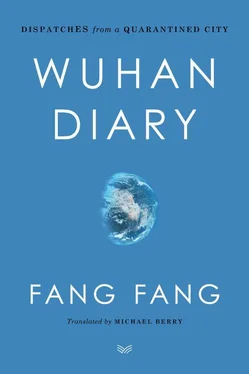It has now been a full 42 days since my second brother has stepped even one foot outside his apartment. At least I can go out to my courtyard if I need some fresh air or want to walk around a bit. At least the courtyard area is safe. Today my daughter showed off some photos of her cooking skills in our family chat group. Although she always complains about how annoying it is to cook, she is still trying her best to maintain a certain quality of life. The pork braised in brown sauce that she just cooked really looked like the real deal! The other day she said that she felt like she had lost some weight, but I’m sure she’ll put those pounds right back on after she gobbles that pork down! Her dad responded to the photo of her dish with a flurry of wild compliments. It is sometimes hard for us to imagine that the younger generation could be this capable. My daughter said that she has already saved a bunch of online cooking recipes. I guess she doesn’t need her parents to teach her how to cook; they’ve got their own way and there are a lot of great teachers online for them!
But as time rolls by, sadder things keep happening. This catastrophe has truly shattered us. It doesn’t take much to make us cry anymore. A colleague sent me a video that was taken in the community where she lives. A citizen was expressing his thanks to a local cadre and that male cadre was crying like a baby. One of the comments posted below the video said: “The people of Wuhan have shed a decade worth of tears this month.” There is a lot truth behind that comment. These tears are not just tears of sadness; they are mixed with a hundred different emotions. But don’t expect the people crying these tears to advance forward singing songs of triumph or to summon up their energy and announce to the world that they have emerged victorious—we still have many more tears left to cry.
This morning at 5:00 a.m., Director Jiang Xueqing [2] Jiang Xueqing (1964–2020) was a highly commended doctor at Wuhan Central Hospital who specialized in thyroid and breast cancer. He also held various administrative and leadership roles within the hospital.
of the Wuhan Central Hospital, where Li Wenliang worked, passed away. He was 55 years old and at the prime of his career. I previously mentioned the fact that I know a lot of people in Wuhan and often run into people I know on the street; I may never have met Director Jiang, but the wife of one of my college classmates knew him very well. She sent me a message this morning, describing Dr. Jiang by saying: “He may not have been a whistleblower, but he was always a kind man with strong principles. His patients all trusted him and he always made time for his friends. He helped me get countless friends in to be seen and would always say: ‘Whenever you ask me for a favor, I always do my very best to take care of it!’ Over the years so many patients sought him out because of his stellar reputation, and he always treated them with kindness when they came in for their appointments or needed surgery…. I tried not to send too many of my friends to see him, but he would always say that patient recommendations were the most important endorsement for a doctor.” Since she knew him so well, my classmate’s wife was really crushed by this loss; she regretted the fact that she hadn’t done more to support him when he was alive.
One of my doctor friends also sent me a message about Dr. Jiang Xueqing, saying that he was the only breast and thyroid cancer specialist in China to have received the prestigious “Chinese Physician Prize.” Too many medical professionals have tragically sacrificed their lives during this epidemic. In private, someone shared with me the story behind Dr. Jiang Xueqing’s death, and it was really too appalling for words. The tragic nature of what happened isn’t just about the loss of his life, but also concerns those aspects of his story that we are not permitted to talk about. So… I won’t talk about them.
With much difficulty and great sluggishness, the outbreak in Wuhan is finally starting to take a turn for the better. There are still several hundred new confirmed and suspected cases that continue to appear on our radar each day. One of my doctor friends was a bit dejected by the numbers he was seeing, based on which he made a prediction: “I think we still need another 10 days before we will see a fundamental change, but we are still probably another month away from really having it under control; then we will still need another two months before we can completely eradicate this virus.” As far as we are concerned, all these time frames—whether it is one month or two months away—are all too long. I really hope my friend’s prediction is wrong. The spring sunshine today is boundless; I really can’t bear for the virus to be the only one that gets to enjoy this beautiful sunny weather; we are all longing to get outside again.
I’ve been receiving a lot of messages about a healer named Li Yuehua who everyone says can work wonders; they say that his method of injection along traditional Chinese acupuncture points is able to cure the novel coronavirus; moreover, he has been administering treatment without any protective gear and yet continues to be impervious to the virus. I had actually been hoping to write about him here in my diary. Actually, this record is just random sketches that I am jotting down; I don’t really have a clear list of topics that I want to cover. But after getting so many letters from people suggesting that I introduce Dr. Li Yuehua to my readers—I have even received videos of him treating patients—I decided I should write about him. Some of the videos I saw were indeed quite something. I heard that he is very much willing to go to hospitals to treat novel coronavirus patients, but they have not approved him. Online, people have been arguing like mad about whether or not he should be allowed to treat patients. I reached out to my friend who teaches at the Institute of Chinese Medicine to get his opinion; he had three points to make:
1. Right now the crux of the issue isn’t whether or not Li Yuehua has an official license to practice medicine; the real question is whether or not his method of treatment works. If it is effective, then we should let him start treating patients. After all, shouldn’t we all be looking for practical solutions right now?
2. There are a lot of folk doctors whose ability to practice is hindered by the fact that they do not have an official medical license. As far as I know, right now there are two methods for capable folk doctors to attain a license: One is by going through an “apprentice training program,” and the other route involves presenting “proof of specialty”; traditional Chinese doctors can go either route to attain the legal right to practice medicine.
3. There are some government offices responsible for granting licenses that actually go out of their way to ignore the empirical facts and instead they just want to clamp down on these folk healers. They do this in the name of fairness, but it is clear that a lot of them have an ulterior motive. But to step back for a moment, Li Yuehua is clearly an example of someone illegally practicing medicine. However, if his method of treatment is found to be beneficial to novel coronavirus patients, the relevant departments should treat this as a special case and make an exception for him to treat patients. They can worry about credentials and licenses later. But right now those government offices are caught up in the issue of Li Yuehua’s legal credentials, and they don’t seem willing to let that go. They have now pushed Li Yuehua into a corner (the documents I saw seem to indicate that they not only want to use procedural methods against him, but may also be planning on taking legal actions against him). On the surface, it looks like everything they are doing is by the book, but in reality it is quite cold-hearted. If Li Yuehua’s method of treatment works, let’s not get all tied up on the question of his medical credentials. Those patients he has successfully treated should have a say in this. It shouldn’t be too difficult to determine the effectiveness of his treatment methods; all they have to do is conduct a simple investigation by looking at his former patients.
Читать дальше



![О Генри - Закупщик из Кактус-Сити [The Buyer from Cactus City]](/books/405348/o-genri-zakupchik-iz-kaktus-thumb.webp)








